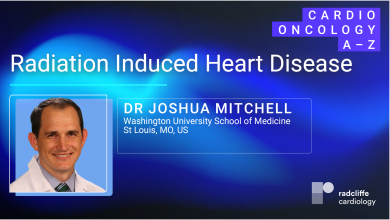Search results
Author(s):
Alberto Balbarini
,
Rossella Di Stefano
Added:
3 years ago
Since endothelial damage and dysfunction play a critical role in atherosclerotic disease, research interest has aimed at evaluating the role of endothelial progenitor cells (EPCs) in vascular endothelial layer maintenance. In contrast to local resident endothelial cells, which have a poor proliferative rate, the regenerative capacity of EPCs and their ability to integrate into blood vessels have…
View more
Author(s):
J Christoph Geller
Added:
3 years ago
Cardiovascular disease is the leading cause of death worldwide. Elevated low-density lipoprotein (LDL) cholesterol levels, hypertension, diabetes and smoking are key modifiable risk factors.1,2 Published practice guidelines3–10 recommend aggressive treatment of individual risk factors and have defined thresholds for the initiation of and goals for treatment (see Table 1). These treatment…
View more
Author(s):
Michael Hecht Olsen
Added:
3 years ago
Shortcomings of Traditional Cardiovascular Risk Factors
Many years of epidemiological and clinical cardiovascular research has taught us which risk factors typically lead to the development of cardiovascular disease (CVD). Since the damaging effects of these traditional cardiovascular risk factors are partly additive, researchers have developed different tools to assess cardiovascular risk in…
View more
Author(s):
Ephraim B Beck
,
Claudia Walther
,
Antje Körner
,
et al
Added:
3 years ago
In developed countries cardiovascular diseases – including coronary heart disease with acute myocardial infarction and ischaemic heart failure, stroke and chronic cerebrovascular disease, aortic aneurysm, valve disease and peripheral arterial occlusive disease – are by far the main cause of death. Since first cardiovascular events are usually seen in mid-life and old age, atherosclerosis has long…
View more
Pre-eclampsia and CVD
Author(s):
Veronica Giorgione
,
Matthew Cauldwell
,
Basky Thilaganathan
Added:
10 months ago
Article
Author(s):
Joshua Mitchell
Added:
1 year ago
In this video we asked, Dr Joshua Mitchell, Assistant Professor of Medicine at Washington University School of Medicine and the Director of our Cardio-Oncology Centre Of Excellence, to summarise the topic of radiation induced heart disease. Dr Mitchell's clinical interests include cardiotoxicity from cancer therapy and cancer survivorship.
Discussion Points:
1. Types of Radiation Induced Heart…
View more
Author(s):
Philippe Besnard
,
Eric Bruckert
,
John Deanfield
,
et al
Added:
3 years ago
Focus on Lifestyle to Reduce Cardiovascular Risk
Pharmacotherapeutic intervention, in particular targeting elevated cholesterol, has undoubtedly been successful in reducing the mortality and morbidity of patients with cardiovascular disease.1 However, these gains have now been largely overtaken by escalating rates of obesity and cardiometabolic disease, driven by the adoption of energy-dense…
View more
Author(s):
Dan Gaiţă
,
Svetlana Moşteoru
,
Laurence S Sperling
Added:
3 years ago
The increasing worldwide prevalence of diabetes mellitus (DM) means almost 360 million people are suffering from this disease (in 2011) and it is estimated to reach 552 million people by 2030.1 The latest European Action on Secondary Prevention by Intervention to Reduce Events (EuroASPIRE) study (2013) has revealed that the mean prevalence of DM in European patients with coronary artery disease …
View more
Author(s):
Pensée Wu
,
Ki Park
,
Martha Gulati
Added:
2 years ago
Author(s):
Cristina Sierra
,
Antonio Coca
Added:
3 years ago
Hypertension Treatment
The aim of antihypertensive treatment is to reduce the cardiovascular morbidity and mortality associated with high blood pressure (BP) levels by measures aimed at reducing BP levels and minimising the impact of possible associated risk factors or co-morbidities.1–5 This therapeutic goal requires previous cardiovascular risk stratification to assess the global risk of…
View more












